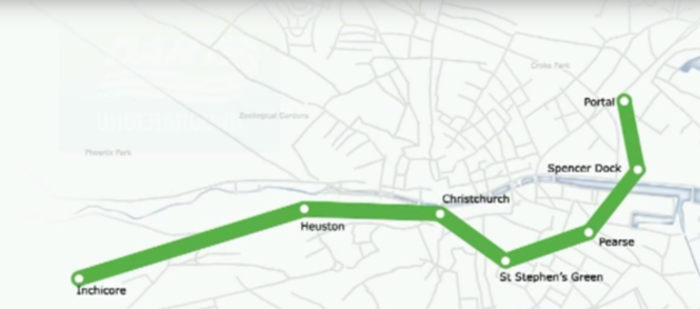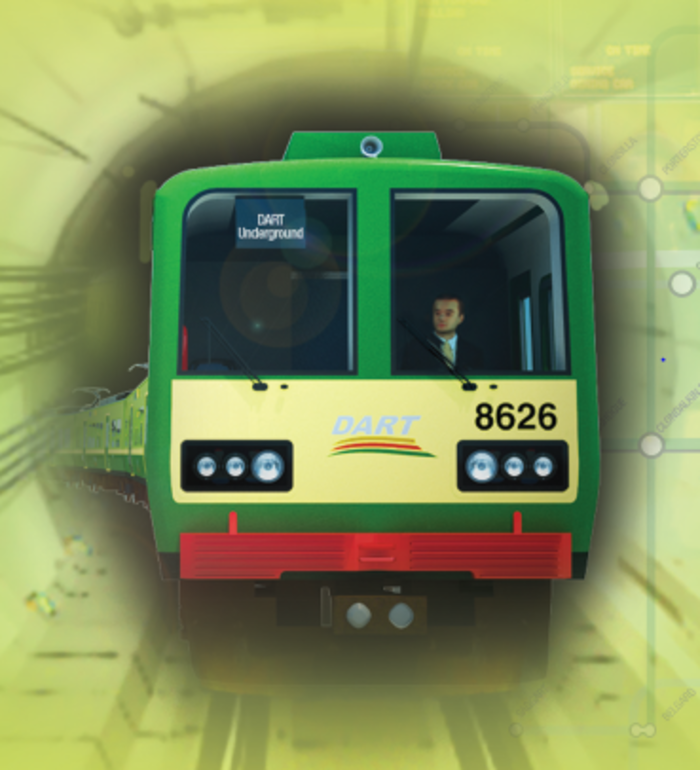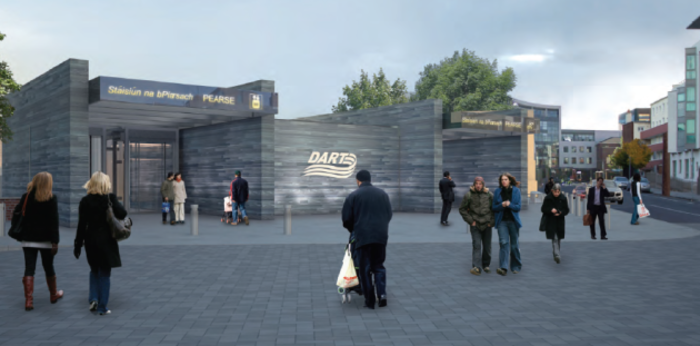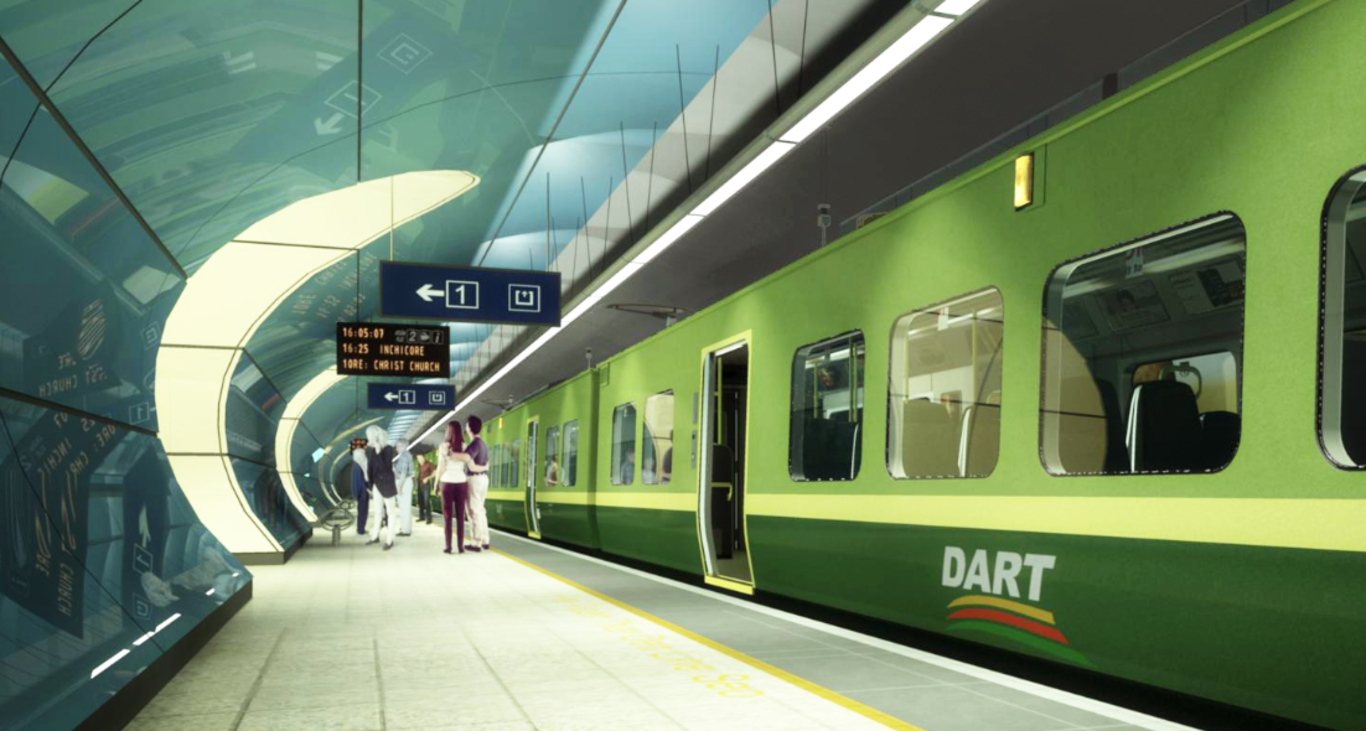'We won't let go': Irish Rail is convinced the long-delayed Dart Underground will go ahead
Peter Muldoon, the project head, says it would allow high-rise building in Dublin city.
THE MAN IN charge of the Dart Underground is convinced that the proposal will get over the line, however he admits construction won’t start this decade.
Peter Muldoon, the Dart Underground project manager, also says that building out the rail line would make it much easier to build high-rise developments in Dublin as it would dramatically improve the city centre’s transport network.
As previously examined by Fora, the Dart Underground scheme is a proposed railway line that would run under Dublin’s city centre and would link all rail, Dart and Luas services in the capital.
The 7.6km line would connect the northern track to Heuston Station and from there on to Kildare rail lines.
As well as the obvious benefits to Dublin, the Dart Underground would also be incredibly useful countrywide. It could potentially link lines across the country, such as Cork to Belfast.
Irish Rail started seriously working on the project in 2002, however it has been plagued by delays.
It was shelved during the recession due to its expense – the estimated cost is about €4 billion – however it is now back on the table and officials are looking at the way ahead for the project.
Nevertheless, Muldoon, who took over management of the scheme in 2008, says that it will likely several years before construction starts.
 The proposed Dart Underground route
The proposed Dart Underground route
“If we start with the tunnel works, it will be about four and a half years (before) there will be a spade in the ground,” he tells Fora.
While that means no construction until next decade for a project many members of the public have lost hope in ever seeing built, Muldoon remains adamant the Dart Underground “will happen”.
“We have an aspiration to build the Dart expansion; it is on the city development plan, it is on the NTA strategy,” he says.
However, the project faces several hurdles it must overcome before work even begins.
Issues
For a start, the NTA is currently reviewing the Dart Underground, with Muldoon expecting the plan to be recommended with modifications in order to save money.
Following the review, which is expected to be finished around the new year, Irish Rail will have to apply to An Bord Pleanála for railway orders along the route.
A railway order will give the semi-state planning permission, as well as the power to issue compulsory purchase orders to acquire land or buildings.
People can object to the plan, and Muldoon say the project will likely require an oral hearing – a process it already cleared once in 2008.

At that stage, after two months of testimony, Irish Rail was granted a 10-year railway order for the project.
However, with that due to lapse and the initiative likely to be re-worked, the organisation will have to go through the whole process again.
Muldoon estimates that if everything goes according to plan, it will take at least 12 years before the project is completed. This means that it would be the other side of 2030 before passengers could use the new line.
Building
The project has faced more issues in the meantime. For example, a Maltese-registered company wants to build an office block on Pearse Street, where Irish Rail plans to build one of the main hub stations for the Dart Underground.
Despite this, Muldoon is confident Irish Rail can find a solution that will allow it to secure all the land it needs for the project.
“I can’t get into specifics on that one, because we are actually dealing with (the company) now. The Pearse one is a very important area,” he says.
“That’s not to say a developer can’t develop that area, but they have to talk to us so what they develop can safeguard what we will be doing.”
He adds: “We’ve been dealing with these for the last four or five years. We’ve never really had a problem, we’ve always reached accommodation with very little impact.
“There are very few areas (where there could be an issue) when we chose the route – we tried to confine it to land that was mostly owned by ourselves or in public ownership.”
 The proposed Pearse Street station
The proposed Pearse Street station
According to Muldoon, the main problem the project still faces in reaching completion is money. Even scaled down, the project will cost billions of euro to build, and it would be a massive undertaking for the state.
“This is an affordability issue. For the people who know most about transport, this is what they want,” Muldoon says.
“The energy is there to drive this through. I will not retire for quite a long time. We’re not letting go. The NTA is very much in favour of it.
“We do accept that there is a cashflow issue, but we will be pushing this because I think it is essential; not only for the city, but for the country.”






